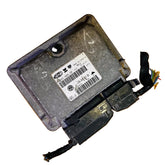Why Does My BMW Steering Malfunction? Causes and Fixes
Driving a BMW should feel smooth and precise, but if your dashboard flashes Steering Malfunction, it can be worrying. Steering issues are not only a safety concern but also affect your car’s handling and performance. In most cases, the problem is linked to electrical parts inside the BMW steering system, such as the ECU, sensors, and steering motor.
This guide explains the common causes of BMW steering malfunction, how electrical parts influence performance, and what fixes you can try.
Common Causes of BMW Steering Malfunction
Power Steering Motor Failure
BMWs with active steering or electric power steering (EPS) rely on a motor controlled by the ECU (Electronic Control Unit). If the motor is weak, faulty, or has wiring issues, you’ll notice heavy steering or total failure.
Faulty Steering Angle Sensor
The steering angle sensor is a critical part of the BMW ECU system. It communicates the wheel’s position to the ECU. If it fails, the ECU cannot correctly calculate steering input, triggering a steering malfunction warning.
Battery and Alternator Issues
Low voltage is one of the most overlooked causes of steering malfunctions. Since BMW steering systems are electronically controlled, a weak battery or failing alternator can disrupt ECU performance and steering response.
Damaged ECU or Software Errors
A BMW ECU malfunction can directly affect steering. Corrupted software, water damage, or faulty wiring may cause the ECU to misinterpret signals from steering components.
Broken Wiring or Loose Connectors
Electrical issues like frayed wires or disconnected plugs between the ECU, sensors, and motor can trigger steering errors.
How Electrical Parts Improve BMW Steering Performance
-
Steering ECU: Processes real-time data from sensors, improving stability and cornering.
-
Steering Angle Sensor: Ensures accurate steering input for smooth handling and safety.
-
EPS Motor: Reduces steering effort, especially during parking and low-speed maneuvers.
-
Battery & Alternator: Provide stable voltage to maintain ECU and steering motor efficiency.
When all these parts work together, your BMW delivers precise, responsive, and safe steering control.
Fixes for BMW Steering Malfunction
Reset the ECU
Sometimes, disconnecting the battery for 10–15 minutes can reset the ECU and clear temporary errors.
Replace the Steering Angle Sensor
If diagnosed faulty, replacing the sensor restores correct steering communication.
Check Battery and Alternator
Test your battery voltage and alternator output. Replace if weak, as low voltage directly impacts steering ECU functions.
Inspect Wiring
Ensure all wiring and connectors between the ECU, steering motor, and sensors are secure.
ECU Repair or Replacement
If the ECU is damaged, consider a genuine BMW ECU replacement. This ensures compatibility and long-lasting performance.
Why Choose Genuine BMW Electrical Parts?
Using genuine BMW ECU, sensors, and steering components ensures:
-
Compatibility with your vehicle software
-
Improved steering precision and safety
-
Longer lifespan compared to cheap aftermarket parts
-
Protection against frequent error codes
At AutoMan Spare Parts, we supply Used Genuine BMW ECU spare parts and electrical components at competitive prices worldwide, including Malaysia, India, Japan, Indonesia, Thailand, Australia, UK, Germany, Mexico, Africa, and the USA.
FAQ
Why does my BMW say steering malfunction?
It usually means there’s an issue with the steering ECU, angle sensor, battery, or EPS motor.
Can low battery cause steering malfunction?
Yes. Low voltage disrupts ECU communication, causing steering errors.
Is it safe to drive with a steering malfunction warning?
It’s not recommended. Steering may become stiff, affecting safety.
How do I fix BMW steering malfunction?
Check the battery, wiring, ECU, and steering angle sensor. Replace faulty parts with genuine components.
Where can I buy genuine BMW steering parts?
You can order Used Genuine OEM BMW ECU, sensors, and electrical components from AutoMan Spare Parts.
TL;DR
BMW steering malfunctions often result from ECU faults, sensor failure, or weak batteries. Fixes include resetting the ECU, replacing sensors, checking wiring, or installing a new ECU. Always use genuine BMW parts for safety and performance.







